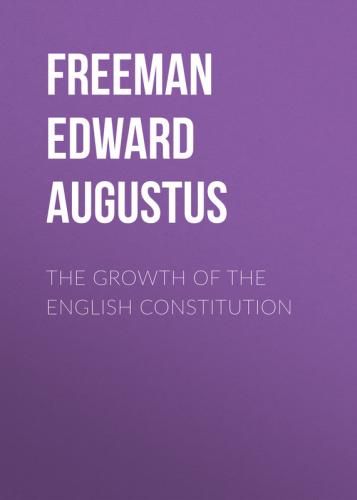I will even go a step further. The Constitution which I have just sketched is indeed the common possession of the Teutonic race, but it is something more. We should perhaps not be wrong if we were to call it a common possession of the whole Aryan family of mankind. It is possible that we may even find traces of it beyond the bounds of the Aryan family17. But I will put speculations like these aside. It is enough for me that the Constitution which was the common heritage of the Teutonic race, was an heritage which the Teuton shared with his kinsfolk in Greece and Italy. Turn to the earliest records of European civilization. In the Homeric poems we see a constitution, essentially the same as that which is set before us in the Germany of Tacitus, established alike in the Achaian camp before Ilios, in the island realm of Ithakê, and even among the Gods on Olympos. Zeus is the King of all; but he has around him his Council of the greater Gods, and there are times when he summons to his court the whole Assembly of the Divine nation, when Gods of all ranks gather together in the court of their chief, when, save old Ocean himself, even all the River-gods were there, and when we are specially told – a fact which might perhaps be pressed into the service of very recent controversies – that not one of the Nymphs stayed away18. If we come down to earth, we find the King of Men as the common leader of all, but we find him surrounded by his inner Council of lesser princes and captains. And on great occasions, Agamemnôn on earth, like Zeus in heaven, gathers together the general Assembly of freeborn warriors, an assembly in which, if debate was mainly confined to a few eloquent leaders, the common freeman, the undistinguished citizen and soldier, had at least the right of speaking his mind as to the proposals of his chiefs, by loud applause or by emphatic silence19. Nor is this picture confined to the host in battle array beneath the walls of Ilios; we must remember that in all early societies the distinction between soldier and civilian is unknown; the army is the nation, and the nation is the army. The same picture which the Iliad sets before us as the constitution of the Achaian army is set before us in the glimpses of more peaceful life which we find in the Odyssey as being no less the constitution of every Hellenic commonwealth on its own soil. Everywhere we find the same three elements, the supreme leader or King, the lesser chiefs who form his Council, and the final authority of all, the general Assembly of the freemen20. We see the same in every glimpse which history or legend gives us of the political state of Rome and the other old Italian commonwealths21. Everywhere we find the King, the Senate, the Assembly of the people, and the distribution of powers is not essentially changed when the highest personal authority is transferred from the hands of a King chosen for life to the hands of Consuls chosen for a year22. The likeness between the earliest political institutions of the Greek, the Italian, and the Teuton is so close, so striking in every detail, that we can hardly fail to see in it possession handed on from the earliest times, a possession which Greek, Italian, and Teuton already had in the days before the separation, in those unrecorded but still authentic times when Greek, Italian, and Teuton were still a single people speaking a single tongue.
I have referred more than once to the picture of our race in its earliest recorded times, as set before us by the greatest of Roman historians in the Germany of Tacitus. Let me now set before you some special points of his description in his own words as well as I am able to clothe them in an English dress23.
“They choose their Kings on account of their nobility, their leaders on account of their valour. Nor have the Kings an unbounded or arbitrary power, and the leaders rule rather by their example than by the right of command; if they are ready, if they are foreward, if they are foremost in leading the van, they hold the first place in honour… On smaller matters the chiefs debate, on greater matters all men; but so that those things whose final decision rests with the whole people are first handled by the chiefs… The multitude sits armed in such order as it thinks good; silence is proclaimed by the priests, who have also the right of enforcing it. Presently the King or chief, according to the age of each, according to his birth, according to his glory in war or his eloquence, is listened to, speaking rather by the influence of persuasion than by the power of commanding. If their opinions give offence, they are thrust aside with a shout; if they are approved, the hearers clash their spears. It is held to be the most honourable kind of applause to use their weapons to signify approval. It is lawful also in the assembly to bring matters for trial and to bring charges of capital crimes… In the same assembly chiefs are chosen to administer justice through the districts and villages. Each chief in so doing has a hundred companions
